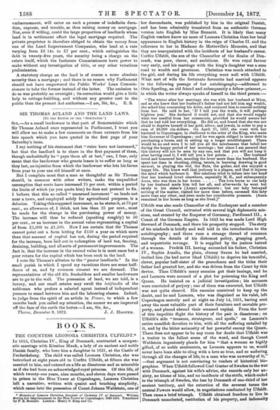SIR 'THOMAS ACLAND AND THE LAND LAWS.
(TO TIM EDITOR OF THE " SPECTATOR.")
Sin,—As a small landowner in that part of Somersetshire which Sir Thomas Acland once represented in Parliament, I trust you will allow me to make a few comments on those extracts from his late speech which you have quoted in the first page of your Saturday's issue.
I say nothing of his statement that " rates have not increased," but that the landlord is to share in the first payment of them, though undoubtedly he " pays them all at last," can, I fear, only mean that the landowner who grants leases is to suffer as long as they last, an injustice from which the landowner who lets his farms from year to year can rid himself at once.
But I complain most that a man so thoughtful as Sir Thomas should, in common with other writers, make the unqualified assumption that rents have increased 75 per cent. within a period the limits of which (as you quote him) he does not pretend to fix. 1 believe that this so-called "unearned increment" on lands not near a town, and employed solely for agricultural purposes, is a delusion. Taking this supposed increment, as he states it, at 75 per cent., an allowance of, I think, not less than 25 per cent., must be made for the change in the purchasing power of money. The increase will thus be reduced (speaking roughly) to 50 per cent., or an increase in the annual value representing a capital of from £1,000 to p1,500. Now I am certain that Sir Thomas cannot point out a farm letting for £150 a year on which more than that amount of capital has not, during the period required for the increase, been laid out in redemption of land tax, fencing, draining, building, and all sorts of permanent improvements. The fact is, that the increase in the annual value is in most cases but a poor return for the capital which has been sunk in the land.
I note Sir Thomas's allusion to the "poorer landlords." In the small parish in which I spend my vacations there are some half- dozen of us, and by common consent we are doomed. The representatives of the old 40s. freeholders and smaller landowners are to go to the wall. The possession of land, we are told, is a luxury, and our small estates may swell the latifundia of the nobleman who prefers a salaried agent instead of independent yeomen to stand between him and the labouring classes. Indeed, to judge from the spirit of an article in Fraser, to which a few months back you called my attention, the sooner we are improved off the face of the earth the better.—I am, Sir, &c.,










































 Previous page
Previous page